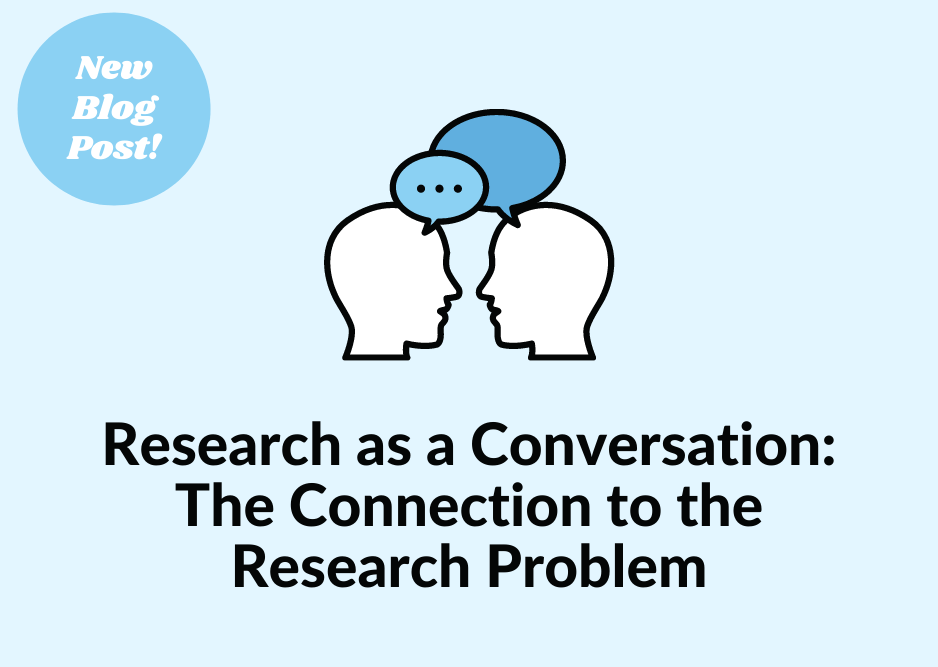Research as a Conversation: The Connection to the Research Problem

Conducting research is a vital component of your study. I’m not talking about data collection and analysis, but familiarizing yourself with and interpreting the previous research that has been conducted on your topic. Having a sense of previous research is essential to understanding your field, its trends, and your topic well enough to develop a solid research problem and believe you can contribute to your field.
Let’s take conversation as a metaphor for research. In a way, research is a conversation, albeit one that occurs among researchers over time and great distances. The metaphor, however, is apt: researchers in a field respond to one another’s research and build on, refute or test one another’s ideas. The conversation of research continues, with older voices and topics dropping out or becoming outmoded and newer voices and trends emerging. Thinking of research as a conversation may help you to understand how to enter and contribute to the field with your own research.
Knowing the Conversation
Before you enter a conversation, you must know the conversation or familiarize yourself with it. Think of someone joining a robust conversation already in progress at a party. The newcomer must listen and understand the positions of the various people in the conversation. Once they feel like they know what the conversation is about and where it’s been, they can meaningfully contribute to the conversation.
Similarly, knowing the conversations in your field involves familiarizing yourself with the research on your topic. You must acquire a sound sense of this previous research. What is foundational? The trends? What is in favor? What is out of favor? Why? Who are some of the major names in the research? What are the major theories? Familiarizing yourself with the research is important for getting a sense of where the field is, what’s important, and where you can contribute. It also gives you a solid foundation for joining the conversation and for developing a research problem.
Entering the Conversation
To enter a conversation meaningfully, you must know what has gone before. You must get up to speed with what people are talking about. The same applies to research. You must have some sense of the state of the research in the field on your topic and familiarize yourself with the research. You will of course need to do this for your study. But from content courses and your academic interests, you should already be somewhat familiar with the research in your field. This is especially important when developing your research problem.
The research problem is, as it sounds, a problem in the research. The research problem represents a problem or issue in or with the research. Although the research problem often stems from a social or organizational issue, the actual research problem itself is developed by looking into the literature to see what research has been conducted on your topic. So, having a sense of the research and familiarizing yourself with the research that is more specific to your topic is essential.
Contributing to the Conversation
Seeing the metaphor to its end, how do we contribute to the conversation? The is about the uniqueness of your study and its significance to research and practice. Your study must be unique and yield knowledge that is not in the literature already. Your study must make a unique contribution. Of course, this is what the research problem is about and why familiarizing yourself with research on your topic is so important. You need to situate your study within the conversation without simply repeating something someone else has already said or done.
Knowing the research, the conversation will allow you to see what has been done and what still needs to be done. It will help you to develop a unique study with a sound research problem. It will also help you to understand how your study and its findings may contribute to the conversation in terms of adding to the extant research and providing information useful to practitioners. Lastly, knowledge can be power, at least in a personal sense. That is, knowing the research will help give you the confidence that you can uniquely and meaningfully contribute to the conversation.

We work with graduate students every day and know what it takes to get your research approved.
- Address committee feedback
- Roadmap to completion
- Understand your needs and timeframe